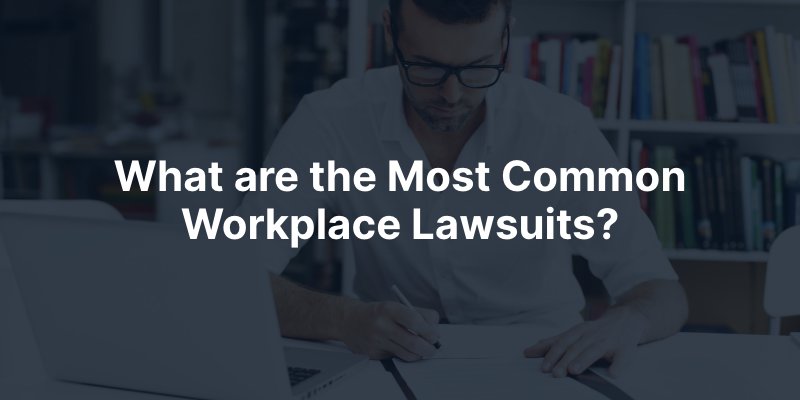Workplace lawsuits can arise from various employment-related issues, but here are the most common types.
If your or a loved one have experienced any of the following unfair treatment in the workplace, contact our Orange County employment law attorneys at Aegis Law Firm today. Call today at (949) 379-6250.
Discrimination lawsuits arise when employees believe they have been treated unfairly based on characteristics such as race, gender, age, religion, or disability. Title VII of the Civil Rights Act of 1964 prohibits discrimination in the workplace, and individuals who experience discriminatory practices can file lawsuits against their employers.

Harassment lawsuits can stem from a range of inappropriate behavior, including sexual harassment, bullying, or other hostile work environment issues. Employers are responsible for creating and maintaining a workplace free from harassment, and failure to address such concerns may lead to legal action.
Wrongful termination lawsuits arise when employees believe they were fired without just cause or in violation of employment contracts. These cases may involve allegations of retaliation, discrimination, or breaches of implied contracts. State and federal laws dictate the circumstances under which termination is considered lawful.
Wage and hour lawsuits often involve issues such as unpaid overtime, minimum wage violations, or misclassification of employees as exempt. The Fair Labor Standards Act (FLSA) establishes guidelines for fair compensation, and violations can result in legal action.
Retaliation lawsuits occur when employees face adverse actions, such as termination or demotion, for engaging in legally protected activities, such as whistleblowing or filing complaints about workplace issues. Employers must ensure that employees feel safe reporting misconduct without fear of retaliation.
Employment contracts, whether written or implied, establish the terms of the employment relationship. Breach of contract lawsuits may arise when either party fails to fulfill its obligations. Disputes over benefits, job responsibilities, or termination terms can lead to legal action.
Employees have the right to a safe workplace, and violations of OSHA regulations can result in legal consequences. Lawsuits may arise from injuries or illnesses caused by unsafe working conditions.
The FMLA provides eligible employees with job-protected leave for certain family or medical reasons. Violations of FMLA regulations, such as denying eligible employees leave or retaliating against them for taking leave, can lead to legal action.
Legal remedies for workplace lawsuits can vary depending on the nature of the claim, applicable laws, and the specific circumstances of the case. Here are some common ones that may be available:
If you believe you have a legitimate reason to file a lawsuit against your employer, follow these general steps:
Before taking legal action, document the details of the workplace issue. Note dates, times, locations, individuals involved, and any relevant conversations or incidents. Keep copies of relevant documents, emails, or other evidence that support your case.
Seek legal advice from our experienced Orange County employment law attorneys at Aegis Law Firm. They can help assess the strength of your case, explain your rights, and guide you through the legal process.
In some cases, you may be required to file a complaint with a government agency before pursuing a lawsuit. For example, discrimination or harassment claims often involve filing a complaint with California’s Civil Rights Department (CRD) or the federal Equal Employment Opportunity Commission (EEOC).
After filing a complaint with a government agency, you may receive a right-to-sue letter. This letter gives you permission to file a lawsuit. If you do not receive a right-to-sue letter, your attorney can guide you on the next steps.
Work with your employment law attorney in Orange County to draft a formal complaint outlining the facts of your case, the legal claims, and the relief you seek. The attorney will file the complaint with the appropriate court.
The complaint must be served on the defendant(s) (usually your employer). This involves delivering the legal documents to the named parties in accordance with the rules of civil procedure.
Once the defendant receives the complaint, they may file motions in response. These motions can seek to dismiss the case or address specific legal issues.
Both parties engage in the discovery process, where they exchange relevant documents, information, and may depose witnesses. This process helps build the case and understand the strengths and weaknesses of each side.
Many lawsuits are resolved through negotiations and settlements. Your attorney will negotiate on your behalf to achieve a resolution that may include compensation, changes in workplace practices, or other agreed-upon terms.
If a settlement is not reached, the case may proceed to trial. During the trial, both parties present their evidence, witnesses, and arguments to the court.
The court will render a judgment based on the evidence presented. If either party is dissatisfied, they may choose to appeal the decision to a higher court.
Remember, each case is unique, and the steps outlined here are a general guide. It is crucial to consult our trusted Orange County employment lawyers who can provide advice tailored to your specific circumstances.